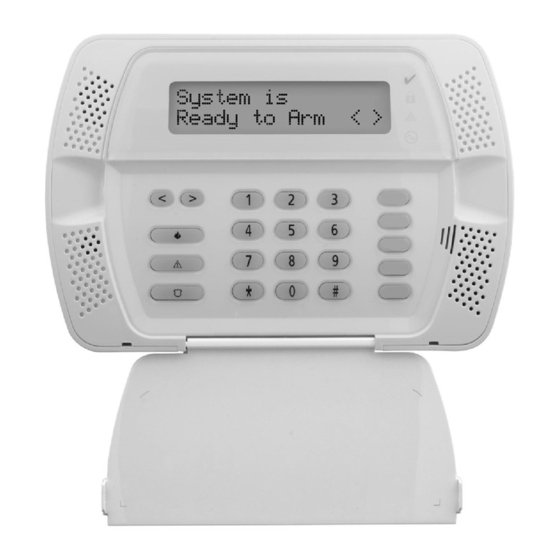DSC SCW9047-868 Manuel de l'utilisateur - Page 8
Parcourez en ligne ou téléchargez le pdf Manuel de l'utilisateur pour {nom_de_la_catégorie} DSC SCW9047-868. DSC SCW9047-868 20 pages. Self contained wireless
Également pour DSC SCW9047-868 : Manuel de l'utilisateur (20 pages)

Remote Arming and Disarming
The system can be armed and/or disarmed (if programmed by the installer) using a remote control
device (wireless key). When arming the system by using the Arm button on the wireless key, the system
will acknowledge the command by sounding a single bell squawk and when disarming using the Dis-
arm button on the wireless key the system will acknowledge the command by sounding two bell
squawks . Three squawks heard when disarming with the disarm button indicates that that an alarm
occurred while the system was armed. If you are unsure of the cause of the alarm, proceed with cau-
tion.
Emergency Keys
F
Press the
(
),
keypad sounder will beep indicating that the alarm input has been accepted and transmission to the
central station is underway. The
setup.
NOTE: The Fire keys can be disabled by the installer.
When Alarm Sounds
The system can generate 2 different alarm sounds:
• Continuous Siren = Intrusion (Burglary Alarm)
• Temporal / Pulsed Siren = Fire Alarm
Intrusion (Burglary) Alarm Continuous Siren
NOTE: If you are unsure of the source of the alarm, proceed with caution! If the alarm was
accidental, enter your Access Code to silence the alarm. If the alarm system is disarmed within the
programmed Abort Window (check with the installer if this option has been enabled on your system
and what is the transmitter delay time programmed), no alarm transmission to the Central Station
will occur. Starting at the end of the Abort Window there is a five minute Cancel window, during
which a user can cancel, by entering his access code, an alarm that has been previously transmitted.
A cancel signal will be transmitted to the Central Station and the alarm system will also annunciate
that the cancel signal was transmitted. Call your central station to avoid a dispatch.
Fire Alarm Pulsed Siren
Follow your emergency evacuation plan immediately!
If the fire alarm was accidental (i.e. burned toast, bathroom steam, etc.), enter your Access Code to
silence the alarm. Call your central station to avoid a dispatch.
2-Way Audio Operation (SCW9047 only)
If programmed by the installer, this feature allows the monitoring station to initiate a 2-way audio
session when an alarm has been received. This feature is used to verify the nature of the alarm or
determine the type of assistance required by the occupant.
NOTE: This feature can be initiated only by the monitoring station after an alarm has been
received. The user can not initiate a 2-way audio session.
Time & Date Programming
Press
plus your Master Access Code to enter User Functions. Use the
the menu option then press
date (MM:DD:YY). Press
within the trouble menu (
ble Conditions on page 6),
NOTE: Your installer may have programmed your system to display the time and date while the key-
pad is idle. Press the
Bypassing Zones
Use the zone bypassing feature when you need access to a protected area while the system is armed,
or when a zone is temporarily out of service, but you need to arm the system. Bypassed zones will
not be able to sound an alarm. Bypassing zones reduces the level of security. If you are bypassing a
zone because it is not working, call a service technician immediately so that the problem can be
resolved and your system returned to proper working order. Ensure that no zones are unintentionally
A
P
(
) or
(
) key for 2 seconds to generate a Fire, Auxiliary or Panic alarm. The
P
(
) key may or may not sound the bell depending on Installer
to select it. Enter the time in 24-hr. format (HH:MM), followed by the
to exit programming. If you are viewing a 'Loss of Clock', trouble from
), press
key to temporarily clear the date and time display if desired.
to directly enter Date and Time programming. See Trou-
4
scroll keys to find
